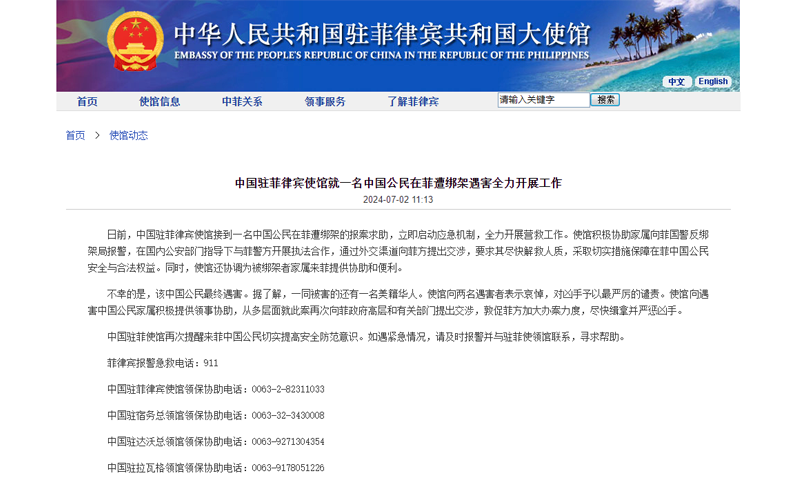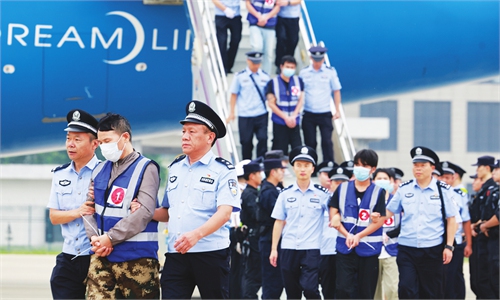Concerns about safety in Philippines rise after kidnapping
Strengthened judicial, law enforcement cooperation needed to combat crime: expert

A screenshot from the Chinese Embassy in the Philippines
The recent kidnapping and murder of a Chinese national and a Chinese-American in the Philippines has raised security concerns among those involved in activities with the country, such as business cooperation. Observers are calling on the Philippines to combat illegal activities effectively and strengthen bilateral judicial and law enforcement cooperation.
After the kidnapping took place, the Chinese Embassy in the Philippines stayed in close touch with the Philippine side and urged it to make every possible effort to work on the case and take effective measures to protect the safety of Chinese nationals in the Philippines, Chinese Foreign Ministry spokesperson Mao Ning said at Tuesday's press briefing.
The embassy on Tuesday urged the Philippines to thoroughly investigate the case, calling for the swift arrest and punishment of the perpetrators.
A police official said that Philippine authorities have identified persons of interest linked to the kidnapping case, the Philippine News Agency reported on Wednesday.
A Chinese national and a Chinese-American arrived in the Philippines on June 20 to meet with other Chinese nationals for a business venture, but later they were kidnapped by an unknown group. The wife of one of the victims received a ransom demand for 5 million yuan ($687,435), which was negotiated down to 3 million yuan. The money was sent, but the families did not hear from the suspects again, according to the report, citing the police official.
The two victims, from different medical facility companies, were found murdered on June 24, according to media reports.
Several medical industry insiders have said that Chinese medical companies may face temporary challenges when expanding into Southeast Asia, according to Chinese media outlet Yicai. The incident is expected to have a direct impact on the business travel market in the short term, leading to a decrease in business travelers, according to Yicai.
The fight against organized crime, especially transnational crime, requires bilateral or multilateral judicial and law enforcement cooperation. In the era of globalization, the trend of transnational organized crime, including drug trafficking and kidnapping, is expanding gradually as well, Li Wei, a researcher and security expert from the China Institutes of Contemporary International Relations, told the Global Times on Wednesday.
Relying only on one country's own judicial and law enforcement system is insufficient to effectively or fundamentally combat these kinds of crimes, and enhanced cooperation between China and the Philippines in law enforcement and judicial assistance is also needed, Li said.
China will do its best to provide assistance within its capabilities during the investigation of these cases, according to Li.
On Monday, Chinese Ambassador to the Philippines Huang Xilian met with Executive Secretary Lucas Bersamin, who also chairs the Presidential Anti-Organized Crime Commission. They reviewed the recent joint efforts of law enforcement agencies from both countries in combating serious crimes such as kidnapping, murder, telecommunications fraud, and human trafficking, particularly activities related to offshore gambling in the Philippines, according to the Chinese Embassy in the Philippines.



